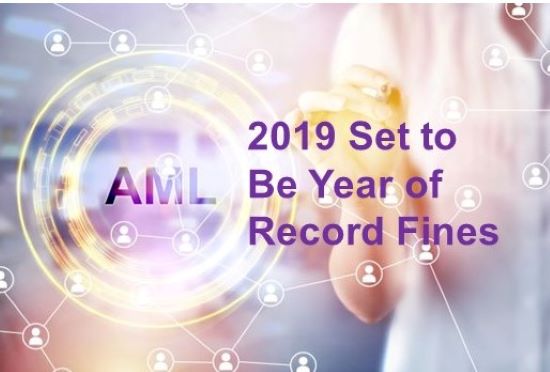Analysis from encompass corporation shows 2019 set to be year of record AML fines
encompass corporation, a fast-growing provider of intelligently automated Know Your Customer (KYC) solutions, recently carried out an analysis of Anti-Money Laundering (AML) related penalties that have been handed down between 2002 and April 2019, with a particular focus on 2018 and 2019. The research comes as numerous global banks have received multi-million dollar fines in the past year.
Key highlights from the research are as follows:
- 2019 looks set to be year of record AML fines, overtaking 2014 ($10.89bn)
- $7.7bn of AML fines handed out in January to April 2019, vs $1.16bn in the same period in 2018
- US-based regulators penalise institutions the most, followed by the UK
- average fine over the past 17 years is $155m, while the median fine is $2.8m
- banks still receive majority of penalties, but there is a growing focus on other sectors
The findings show that in January to April of 2019 alone, the combined value of penalties given out was over 70% of the total awarded in the whole of 2014 – the year which currently holds the record for highest total value of fines. It is nearly double the value of AML fines from the entire of 2018 ($4.27bn), despite the number of penalties being roughly a third (9 in January-April 2019 vs 29 in 2018).
| Country/Region | 2002 to April 2019 | 2018 | January to April 2019 | |||
| Total value of penalties | Number of penalties | Total value of penalties | Number of penalties | Total value of penalties | Number of penalties | |
| USA | $19.85bn | 176 | $891.1m | 9 | $45.6m | 2 |
| UK | $1.67bn | 28 | $12.8m | 3 | $1.23bn | 4 |
| Europe excl. UK | $10.43bn | 37 | $2.59bn | 10 | $6.44bn | 3 |
| Asia | $1.55bn | 37 | $74.9m | 5 | $0 | 0 |
| Latin America | $33.7m | 2 | $0 | 0 | $0 | 0 |
| Africa | $13m | 9 | $1m | 1 | $0 | 0 |
| Oceania | $700.1m | 2 | $700m | 1 | $0 | 0 |
 Wayne Johnson, Co-Founder and CEO of encompass corporation, commented: “Ever since the financial crash in 2008, there has been an ever-growing focus on the identification and prevention of money laundering and other financial crimes at financial institutions. Since 2014, total AML penalties have remained above a billion dollars every year, perhaps reflecting the increased regulatory focus on this area since the Panama Papers were leaked in 2015. Multi-million dollar fines are becoming the ‘norm’, and 2019 looks set to be the biggest year yet in terms of the value of fines handed out by regulators.
Wayne Johnson, Co-Founder and CEO of encompass corporation, commented: “Ever since the financial crash in 2008, there has been an ever-growing focus on the identification and prevention of money laundering and other financial crimes at financial institutions. Since 2014, total AML penalties have remained above a billion dollars every year, perhaps reflecting the increased regulatory focus on this area since the Panama Papers were leaked in 2015. Multi-million dollar fines are becoming the ‘norm’, and 2019 looks set to be the biggest year yet in terms of the value of fines handed out by regulators.
Given their significance in the global financial markets, it isn’t surprising that the focus for fines remains predominantly on banks, although we are increasingly seeing the spotlight land on companies in other industries, such as legal, gaming and cryptocurrency. This shows that there is a growing recognition that these sectors are also prime channels for money-laundering, and we expect to see this shift to non-financial services businesses continue in the coming months and years.
Although not currently the case in 2019, overall, US-based regulators have been the most active over the period in which our research was carried out. Again, this is not a surprise as the US financial market is the biggest in the world and it also has a transparent regulatory culture, which not all jurisdictions do. This transparency is shared by the UK, which is the second most active jurisdiction when it comes to AML penalties. The current US administration has also been increasingly focused on sanctions, suggesting greater future enforcement actions by US regulators.
We will continue to monitor this data and re-analyse it in three months’ time: it will be very interesting to see if any further regional or sector insights come to light.”
encompass intelligently automates information and news discovery for Know Your Customer (KYC) requirements for onboarding, event-driven refresh and remediation.
Driven by a firm’s internal policies and choice of reliable, independent sources, encompass automatically constructs corporate ownership structures, discovers beneficial owners, and screens relevant entities and persons for regulatory, reputational and financial risk in minutes.
encompass uses advanced intelligent process automation to dynamically build a comprehensive KYC profile from multiple sources, including corporate registries, company and regulatory data, adverse media and identity verification – enabling fast, confident decisions.
With encompass, firms can:
- Improve the quality of their KYC – get the full picture of a customer for safer, more informed decisions
- Reduce the cost of KYC – eradicate valuable hours wasted on repetitive, manual tasks
- Gain full control of KYC – full automation ensures policies and procedures are consistently enforced
- Improve customer experience – reduce onboarding times from up to four hours to just four minutes
For more information, please visit www.encompasscorporation.com Follow us on Twitter: @encompasscorp
Methodology:
The underlying data for this analysis was supplied by Dr Henry Balani, a financial industry advisor to encompass corporation. All data was compiled from reputable national news sources and cross referenced against regulator website where available. Penalties and actions from active jurisdictions where cross-border financial transactions are high were included in the research. While occasionally there are smaller, less active jurisdictions or agencies that impose penalties, these amounts are typically smaller and do not necessarily affect overall trends and were not included in this research
Dr. Balani is currently Principal at Blockchain Advisory Institute, where he advises companies on using the Blockchain to drive innovation in the real estate and the financial services sector. He is a noted industry commentator on issues leveraging the Blockchain, Digital Assets, Sanctions and Regulatory Compliance. As a published academic, Dr. Balani also lectures on international business, economics and regulatory compliance courses globally. At Accuity, a division of the RELX Group (formerly Reed Elsevier), he was responsible for driving Blockchain partnerships and thought leadership in the financial services industry.
Dr. Balani holds a Doctorate in Business Administration from the University of Wisconsin, an M.B.A. from Northern Illinois University in the USA and B.S. in Economics, International Trade and Development from the London School of Economics.
Source: Encompass



























